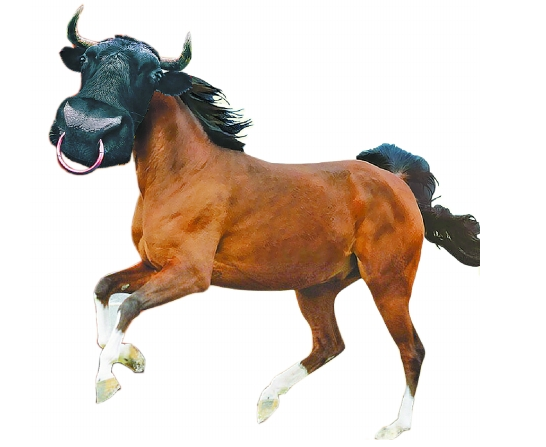Britain The horse-meat scandal
英国 马肉风波
And the winner is
谁是赢家?
What horse-shy consumers are eating instead
不吃马肉的消费者他们还可以吃什么?
On the face of it, local butchers and vegetarianism have little in common. But—upholding the principle that every crisis helps someone—both have been buoyed by the recent discovery, in Britain and elsewhere, of horse meat in dishes supposedly made of beef.
乍看起来,当地的屠夫和素食主义者之间没有什么共通之处。但是,——根据“每次危机发生都会有人受益”的原则看来——最近的一项调查发现对屠夫和素食主义者都十分有益。即在英国及其他一些地区发现餐盘里的肉类是马肉而不是应当出现的牛肉。

A poll by ComRes, a market-research agency, showed that 7% of respondents had stopped eating meat altogether as a result of the equine scandal. Another survey by Consumer Intelligence, a research firm, found that 6% knew someone who had become vegetarian in reaction to the reports. Holland and Barrett, a health-food chain, reported increased sales in its soya and tofu lines in early February. A meat-free Sunday roast was particularly popular, with sales up by 50%, while vegetarian meatballs had jumped by 30%.
由一家市场调查机构ComRes进行的民意调查显示,由于马肉风波,有7%的调查对象表示他们已经连肉都不吃了。由另一家调查公司Customer Intelligence进行的一项调查发现,面对马肉风波的报道,有6%的调查对象表示他们了解到有人因此而变成了素食主义者。一家健康食品连锁店Holland Barrett报道称,自本月初始,豆类制品的销量有大幅提升。一种无肉的周末烧烤最近特别流行,其消费量增长了50%,同时素肉丸的销量也上升了30%。
But other consumers are buying better meat, rather than giving it up. The National Federation of Meat and Food Traders reports a 15% increase in sales at independent butchers—which often specify the source of their meat, and butcher it on site. Sales of beef burgers and mince have leapt 30%. “Health scares are always good for us,” says Brindon Addy, owner of a shop inYorkshireand chairman of the Q Guild, an organisation of 120 local butchers.
但有其他的消费者正在购买了一些更高品质的肉类,而不是放弃吃肉。英国肉类及食品贸易联盟(The National Federation of Meat and Food Traders)报道称,传统肉铺的销售量上升了15%,商铺里的屠夫通常会详细说明肉类的来源,并且当场屠宰。牛肉汉堡和牛肉饼的销售量攀升了30%。一位约克郡的店主,同时也是Q协会(一个由120位当地屠夫构成的组织)主席的布雷顿·艾迪(Brindon Addy)表示,“对健康问题产生恐慌通常是对我们有益的。”
The other thing that veggies and artisan butchers have in common is their rarity. The Vegetarian Society estimates that only 2% of Britons are stringent non-meat-eaters (a figure that is set to quadruple if the recent trend proves lasting). For their part, independent butchers are increasingly scarce on the high street: their numbers have fallen by 57% since 1990, to just over 6,000 nationwide. But whether the boost to either will endure after the horse furore recedes is doubtful. Recalling his customers’ attitudes after the “mad cow disease” outbreak 17 years ago, Mr Addy gloomily observes that, “after three months, they slope back to supermarkets.”
另一个素食主义者和传统屠夫间有共同点的地方就是他们都很稀有。《素食者协会》杂志估算过,只有2%的英国人是严格意义上的不食肉者。(假如最近的趋势得以延续,这个数据将会翻4倍)。站在传统屠夫的角度来看,他们越来越害怕走向高端市场:自1990年开始,传统肉铺的数量下降了57%,全国肉铺数量也只是刚过6000家。但是,在马肉风波引起的公愤平息之后,这种传统屠宰店的热潮是否能够持续下去,仍难下定论。在“疯牛病”事件爆发的17年后,这次危机再次唤回了消费者对传统屠宰店的关注,但艾迪仍沮丧地表示“三个月后,消费者又将回到超市购物。”翻译:沈晓













